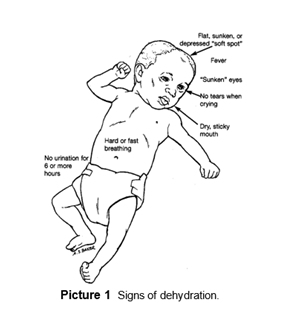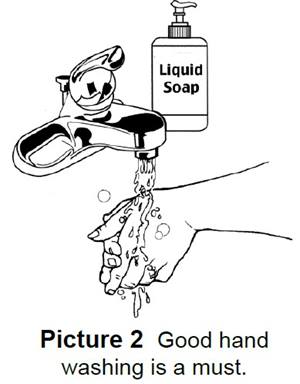Rotavirus

Rotavirus (row-tuh-vai-ruhs) is a contagious illness that causes diarrhea. The virus spreads easily from person to person. When someone touches an infected person’s poop (stool), and does not wash their hands well, they can leave the virus on anything they touch. The virus enters the body when a person’s fingers touch something contaminated with the virus, and then put their fingers in their mouth.
- Rotavirus often occurs in the winter and spring. It's more common in infants and children up to about 2 years of age, but older children and adults can get it too.
- Most infants have been immunized (vaccinated) against rotavirus and are likely to have only mild symptoms. A person can get a mild case again if re-exposed.
- Rotavirus usually does not cause serious illness. The greatest risk is for infants. Severe vomiting and diarrhea can lead to losing too much body fluid (dehydration). Some infants may need to be hospitalized to replace the lost body fluids.
Diagnosis and Symptoms
The diagnosis of rotavirus is usually made based on symptoms. Stool specimen tests are rarely done. Symptoms start 1 to 2 days after a child is infected and can last for 3 to 8 days. They include:
- Fever
- Nausea, vomiting, and loss of appetite
- Watery stools or diarrhea
- Mild stomach pain or cramping
Signs of Dehydration
Dehydration is the most serious risk to children and can be dangerous. Call your child’s doctor or health care provider if you see any of these signs (Picture 1):

- Newborns (0 to 4 months of age) – less than 6 wet diapers in one day
- Children (4 months or older) – less than 3 wet diapers in one day or pees (urinates) less than 3 times in one day
- Very dark urine
- A dry, sticky mouth. Sometimes, lips may be dry or cracked on the outside, especially in the winter.
- Fewer or no tears when crying
- Hard or fast. breathing
- No energy (lethargic) or hard to wake up, acts confused
- Bellyache (abdominal pain) that will not go away
Treatment
Rotavirus symptoms usually go away without treatment. Since it is caused by a virus, antibiotics will not help and may cause more diarrhea.- Make sure your child gets plenty of rest.
- Give regular foods. If your child is vomiting, wait a few hours and try again.
- Avoid any red-colored food or drinks that might look like blood in diarrhea or vomit.
- Do not give over-the-counter medicines to stop the diarrhea or vomiting.
- Check your child’s temperature using a digital thermometer. Wash the thermometer thoroughly after each use.
- Use only a rectal thermometer in infants under 3 months of age.
- For infants 4 months of age or older, take rectal, oral, ear, or armpit (axillary) temperatures.
- When your child reaches 4 years of age, mouth (oral) temperatures are okay.
For Dehydration:
- Continue giving breast milk or formula to infants, and milk to toddlers and older children. Do not only give them water.
- Give extra fluids in little sips throughout the day. Do not give fruit juice or liquids that are high in sugar, such as Hi-C®, Hawaiian Punch®, Kool-Aid®, or syrups. Too much juice can cause diarrhea.
- Your child may need to drink an oral rehydration solution (ORS) like Pedialyte®, Naturalyte®, Infalyte®, or K-Electrolyte®. An ORS helps replace the electrolytes (salts) and fluids that your child needs.
- You can buy ORS in liquid or powder form or as popsicles at most pharmacies without a prescription. ORS store brands are just as good as a brand name.
- The amount depends on your child’s weight. Ask the doctor or health care provider how much to give. Do not water down (dilute) or mix an ORS with formula.
- Offer your child other things to drink. An ORS should not be given as the only fluid for more than 6 hours.
- Do not use sports drinks. and home remedies instead of an ORS. They do not have the right mix of electrolytes.
Prevention
These are the best ways to prevent rotavirus from spreading to others are:- Make sure your child gets the rotavirus vaccines on time. The first one starting at 2 months of age. All doses should be given by 8 months of age.
- Wash your hands before and after every diaper change, after helping your child in the bathroom, before touching food and before eating (Picture 2).

- If your child is old enough to crawl or walk, wash their hands often.
- Teach older children to avoid touching their mouths.
- Wipe down any toys that your child usually puts in their mouth and hard surfaces that your child touches with disinfectant, bleach solution, or soap and water.
- Wash soiled clothes right away, in hot soapy water.
- Do not send your child to school or childcare until the diarrhea has stopped.
When to Call the Doctor
Call your child’s doctor or health care provider if they:
- Will not eat or drink liquids and look dehydrated.
- Have blood in their diarrhea
- Have severe stomach pain
- Have a high fever. Use a digital thermometer and wash it thoroughly after each use.
| Age | Temperature or Fever | ||
| Younger than 3 months of age |
|
||
| Older than 3 months of age |
|
||
| Any Age - Has a Fever and: | |||
|
|
||
|
|
||
HH-I-206 | ©1999, revised 9/2022 | Nationwide Children’s Hospital
